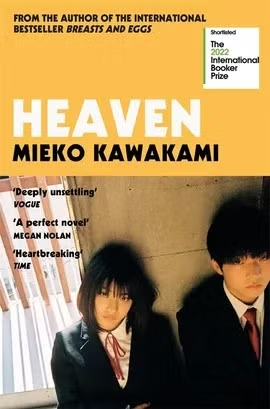Mieko Kawakami
Heaven
Makin Hemat dengan Bebas Biaya Pengiriman Rp0.
Pilih toko Gramedia terdekat dan opsi pengiriman “Ambil di Toko” ketika checkout.
Format Buku
Deskripsi
Middle school is hell. In Mieko Kawakami’s Heaven, her unnamed fourteen-year-old narrator endures slaps, shoves, kicks, and worse from bullies who mock his lazy eye. The torture has gone on so long that he’s giving in. “I told myself it didn’t really matter what I did. Nothing would change.” He wants only to survive from one moment to the next.
But things do change. His classmate Kojima, who is also being bullied, begins sending him handwritten notes. He’s drawn to Kojima’s writing, her “thin letters that looked like little fishbones,” and to her voice that reminds him of a 6B pencil, “soft and rigid at the same time. Almost unbreakable.” Though they rarely meet in person, their friendship blossoms through their correspondence. Over summer break, they visit an art museum, where Kojima plans to show him her favorite painting. She says it depicts a man and a woman who have found harmony after enduring immense suffering. She calls the painting “Heaven.”
Though Kawakami’s writing career began more than a decade ago, her longer work has only recently appeared in English. Published in Japanese in 2009, Heaven was Kawakami’s first full-length novel. It won the Murasaki Shikibu Prize for Literature, an award reserved for female authors. Sam Bett and David Boyd, who co-translated her novel Breasts and Eggs (Europa Editions, 2020), collaborated again to provide this seamless translation.
Set in Japan in the early 1990s, Heaven is—on its surface—a coming-of-age story about two outcasts who find comfort in each other. But they’re not looking for first love. Trapped in a suffocating present, they want an answer to a fundamental question: why do we suffer?
Through lengthy, exploratory conversations, the narrator and Kojima delve into that why. Kojima already has a well-defined personal philosophy, which she shares over several monologues. She believes that everything has meaning. Even suffering can be transformative. “When it’s all over,” she says, “we’ll reach a place, somewhere or something we could never reach without having gone through everything we’ve gone through.”
What do the bullies believe in? In a pivotal, shattering conversation, the narrator confronts one of his tormentors with that question. Momose can’t help laughing at the narrator’s moral conviction. “Don’t try to tell me something stupid like it’s my responsibility to think about your feelings. Who does that?”
Though the monologues in Heaven investigate the human condition, they aren’t dry. They ground the novel in the messy rawness of adolescence. In the following example, Kojima explains why there has to be a god:
“My dad worked so hard, and not for his own sake. He did it for his family. But it didn’t matter how hard he worked … [H]e’s so poor now he can’t buy himself new shoes, and my mom and I have gone on without him, living in luxury. How else could that happen? It’s so stupid, I can’t even begin to understand it. I have to believe there’s some kind of god, who sees everything that happens, and understands the meaning of everything we’ve been through, when everything is over.”
(Harvad Review)
Baca Selengkapnya
Detail Buku

